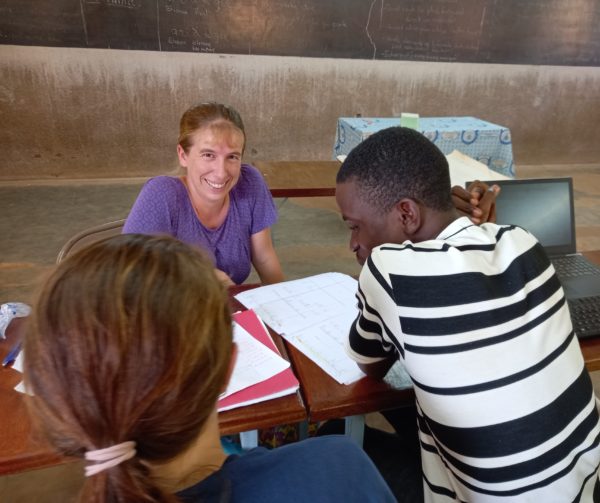
The dog, who has a red collar, just tried to bite me!
The dog who has a red collar just tried to bite me!
Can you tell the difference between those sentences? In each one, how many dogs are on the scene in your mind’s eye? According to “correct” English grammar, I believe that in the first one there should only be one dog in your mind’s eye, and in the second there should be several. Is that how it worked for you? (It’s almost like magic, isn’t it?)
Anyway, those parts of the sentence that start with “who,” are called relative clauses. “Who has a red collar” = relative clause. And, as we just saw above, there are two types in English: (1) those that just describe something or someone and (2) those that help distinguish something or someone from others. Are you following so far?
In the discourse analysis workshop I attended/helped with the last few weeks, one of the things that was taught was that these relative clauses, if you aren’t careful with them, can cause a Bible translation to unknowingly be heretical! Yikes!
You see, in most of the languages around here, only the second type of relative clause exists. That means that whether you have the commas or not, whenever you have a “who,” it is used to distinguish that person or thing from others. Let me give you an example, though I’ll take out all the commas so that the English doesn’t confuse us:
- If I said, “My mom who has a red dress is pretty,” it would be the second type of relative clause, meaning that of all of my moms, the one who has a red dress is pretty. You couldn’t make it say anything else, even if you tried adding the commas or something. Wow! Now, here where polygamy is common, they’d see nothing wrong with that – your dad’s wife who has a red dress is obviously the one that you think is the prettiest of all of his wives!
Can you see how that could get heretical very fast? Imagine the following sentence:
- Joseph took his wife, who was pregnant, and went to Bethlehem.
If you translated that directly into most any of the languages around here, they’d hear: Joseph has multiple wives. He took the pregnant one with him to Bethlehem. Oops! I don’t think that’s what you would have meant to say!
Or it gets even worse:
- God, who is good, made the whole world.
Can you see where this is going? If you translated this with a “who” like that into most any of the languages around here, they’d automatically hear the following and you couldn’t use commas to “fix” it: There are multiple gods. But the one God who is good, He’s the one who made the whole world. Wow, that’s really bad heresy! And the scary part is that it looks good on the outside, so those who wouldn’t know to look for it wouldn’t realize that the translation was teaching heresy instead of good theology.
Can you see why training is important for Bible translation? And why it’s really helpful to have translation consultants who can know some of these kinds of things and be on the lookout for them? Take a minute to pray for translation teams and consultants around the world, that they’d be able to make their translations accurate, natural, and clear.
Good hearing from you, you must have a good time being back home for a time. I hope so, because you deserve to have time with your family.
I’m not so good with your Discourse Analysis. Maybe I’m too lazy, or it is too much for an 80 year old man, (PLEASE DON’T PAY ATTENTION TO MY GRAMMER.) Thank you.
Your name comes before our Lord in our home everyday. The letter opener that you gave me is on the table where I have breakfast every morning. Kidding, we remember you because of the important work for our Lord. We are delighted to be a partner in sharing toe Gospel.
Several years ago I contacted Neuropathy in both legs and is has slowed me down considerably. There is no cure. I am given pain medicine for the pain. One of the nicer attributes is that I have several hours of peace and quiet for my morning devotions.
Susie, you are loved by Pat and me. Probably your schedule is difficult, but we know that He will see you through anything that you are called to do.
In Christ.
Pat and Larry